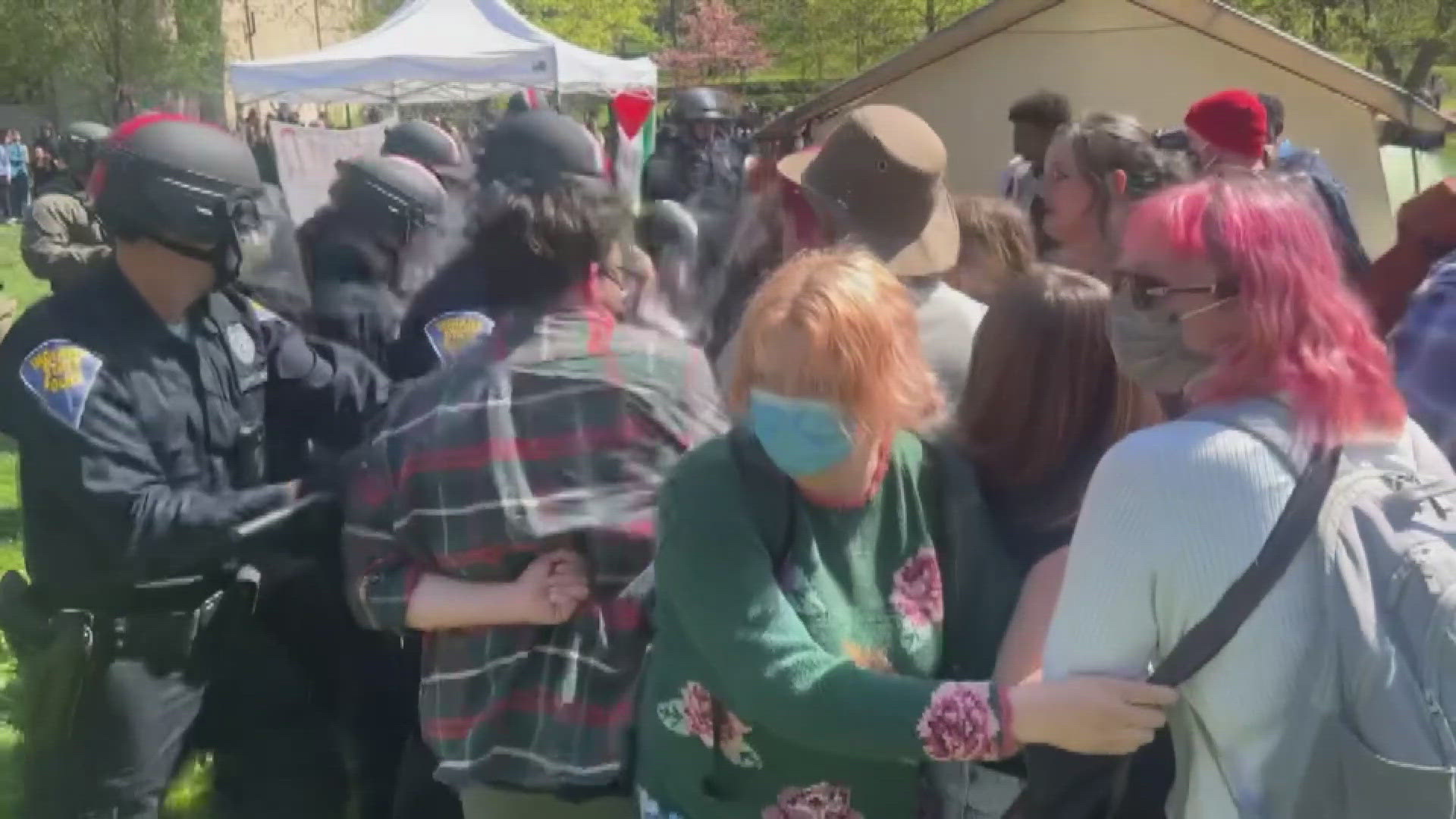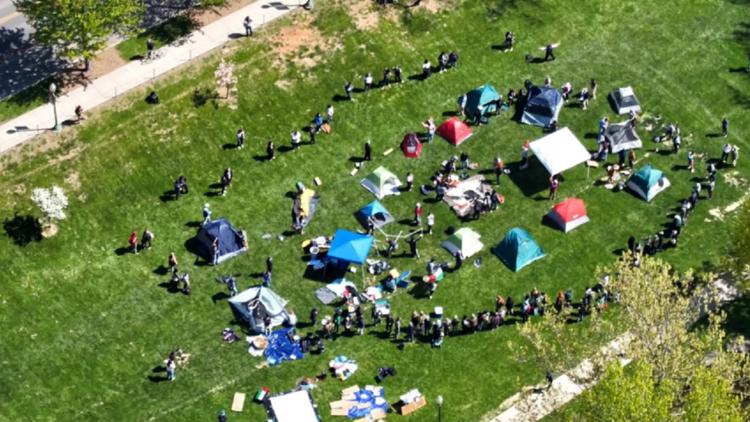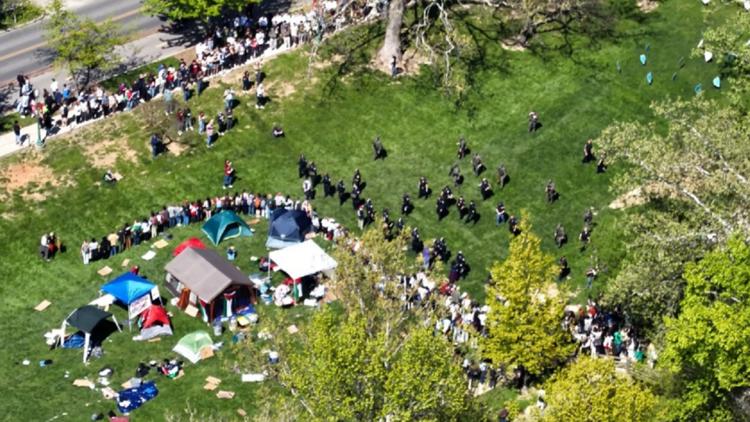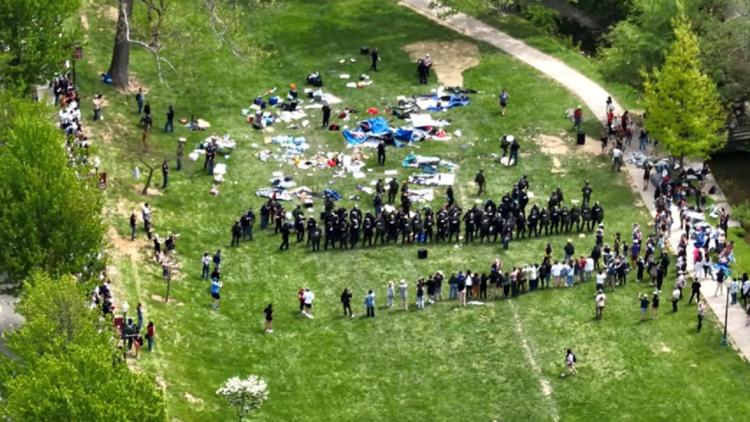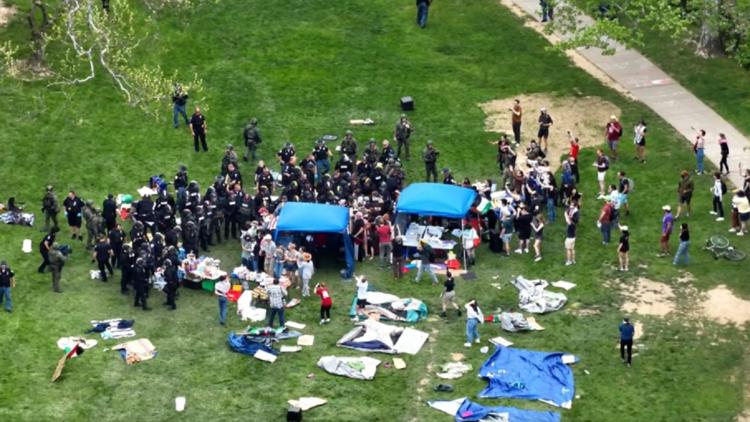BLOOMINGTON, Ind. — Indiana University administrators may have caused confusion and accelerated tensions with protesters by enacting a last-minute policy change the night before April’s Gaza war protest arrests in Bloomington, an independent law firm found.
The 77-page report is the conclusion of a six-week investigation conducted by the international law firm, Cooley.
On April 25-27, Indiana State Police arrested 55 protesters who set up an encampment in Dunn Meadow, which has been a long-standing space on campus for students to engage in expressive activity.
The Monroe County Prosecutor's Office has since dropped all the charges against the arrested protesters.
IU professor Heather Akro was one of the protesters who was arrested.
"I really was largely in a state of shock with all of the heavily armored police, the automatic weapons, the snipers on the roof. Actually took a picture of the snipers, and then, one of the students asked me to hold their hand," Akro said.
In addition to interviews with IU students, faculty and university police, the firm looked through more than 10,000 internal documents and emails, more than 100 hours of video footage and relevant university policies.
The firm also interviewed members of the Indiana University Police Department, Indiana State Police and the Monroe County prosecutor.
The report concludes that IU administrators acted in good faith with concerns over safety risks from an encampment, but the sudden and unannounced policy change was not effectively implemented.
“IU leadership’s decision to change the Dunn Meadow policy was permissible under university policies and applicable legal standards, including the First Amendment; however, doing so the night before the planned encampment caused a number of unintended negative consequences,” the law firm wrote in the report.
PHOTOS: Protests at Dunn Meadow on IU's campus
The report also concluded that IU has had a decades-long history of “inconsistently” enforcing its policies, which leads to confusion for students, faculty and campus police.
The IU Police Department is understaffed, the report shows, and the firm included more funding to university police in their list of recommendations:
- Recommendation 1: IU should approve a new expressive activity policy.
- Recommendation 2: To establish clearer and more consistent policies, the IU president should direct a review for gaps or inconsistencies between university-wide and campus-specific policies and make recommendations to the Board of Trustees on necessary changes.
- Recommendation 3: IU should implement adequate training and communication about its policies and appropriate audit procedures to ensure the consistent application of policies.
- Recommendation 4: IU should establish a plan for implementing any new policy related to expressive activity.
- Recommendation 4.1: IU should clearly communicate this plan to relevant stakeholders and set expectations regarding the Indiana State Police’s involvement.
- Recommendation 4.2: IU should impose predictable and consistent conduct consequences for violating any new policy.
- Recommendation 5: IU should increase funding to the IU Police Department in order to hire and retain more officers and bolster existing training and technological capacity.
- Recommendation 6: IU should consider utilizing campus-wide communications to alert the IU community of encampments or other large-scale or disruptive protests.
- Recommendation 7: IU should consider adopting a policy of not issuing official statements about public matters that do not directly affect the university’s core functions.
Recommendation 8: IU should improve communications involving critical constituencies on campus.
The university is set to vote on a new expressive views policy on Monday, July 29. After a report about the protest response came out Thursday afternoon, Akro, along with other students and faculty, said they are upset.
"I'm not even sure how I can do my own research or teach my own classes under the current policy. It is not clear that it does not apply to teaching and research," Akro said.
Bryce Greene was another student who was arrested. He read the full report released Thursday and said he doesn't agree with the findings, nor the proposed policy change.
"They are going to use the report to push for the policy, and they're going to say that we are implementing this policy on recommendation of the report, but that's inaccurate because this policy that they're trying to push to was written long before this report was released," Greene said.
IU administrators have expressed new concerns about unhoused people moving into the Dunn Meadow encampment or establishing their own on campus.
Over the summer, one unhoused individual experienced a drug overdose in the encampment, while another living in the encampment as of this writing has a lengthy and violent criminal record, the report states.
The Indiana University Board of Trustees met Thursday, July 25, and will meet again on Monday, July 29 to discuss the expressive activity policy, which would be implemented on Aug. 1.
Greene said no matter what is voted on at the board of trustees meeting on Monday, he plans to continue fighting.
"We'll fight no matter what. That's for sure. The vote will only determine how we fight," Greene said.
13News reached out to Indiana University for a comment, but was referred back to the comments the university made when they released the report.

